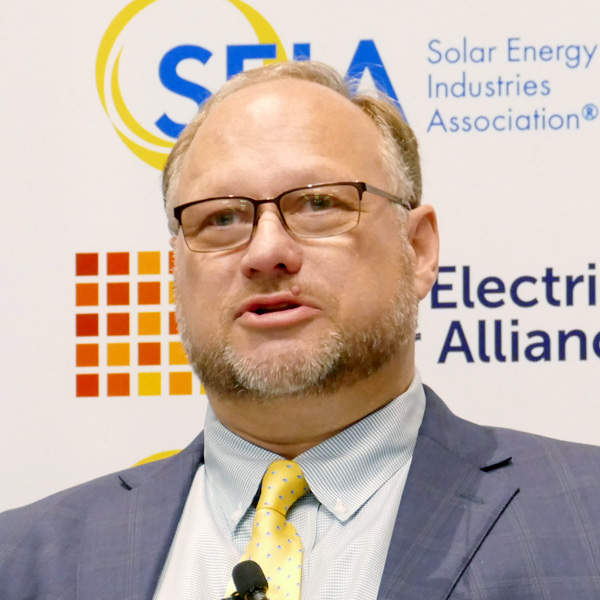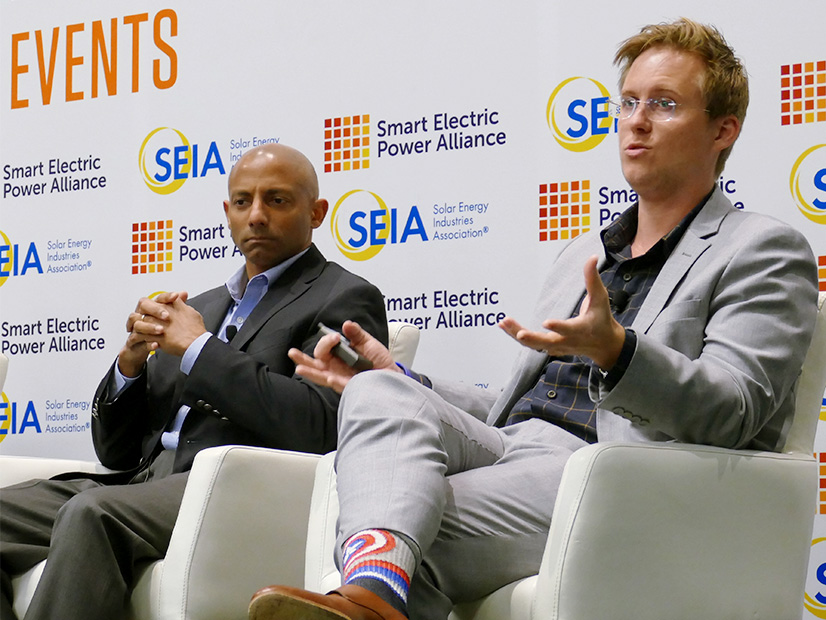ATLANTA — Solar advocates last week celebrated the defeat of a Florida bill that would have phased out the state’s net metering program — while warning the battle is far from over.
The bill (HB 741), which Florida Power and Light (NYSE:NEE) said was needed to address cost shifting, cleared the House and Senate by wide margins but was vetoed last month by Gov. Ron DeSantis (R). It would have gradually reduced net metering rates until reaching the avoided-cost rate in 2029.
Jim Purekal, manager of market development and policy for rooftop solar company SunPower (NASDAQ:SPWR), told the RE+ Southeast conference that DeSantis vetoed the bill because of rising inflation, a rate increase that followed FPL’s acquisition of Gulf Power (which “drove hundreds of phone calls and emails into the governor’s office”) and a provision that would allow FPL to charge ratepayers for lost revenue from competition with solar.
“The battle is not over yet,” Purekal told the conference, sponsored by the Solar Energy Industries Association (SEIA) and Smart Electric Power Alliance (SEPA). “The fight is really just kind of beginning at this point, because we know that Florida Power and Light is licking their wounds, rolling up their sleeves, and they’re going to be back again. And I don’t know what that … looks like just yet,” he said. “But we do know that what happened over the last couple of months has shown that the solar industry in Florida is here to stay, and we are a formidable force.”
Will Giese, Southeast regional director for SEIA, said that “when this bill was first introduced, it was like the immediate and sudden death of the solar industry,” and [proponents] wanted to get it through before the legislative session even started in January.
“I think it’s a credit to folks like Jim and a number of other solar advocates that were down there [in the state capitol],” Giese said. “I mean, there was somebody down there every single week until the end of the legislative session from the solar industry, walking the halls, educating people.”
Giese said the industry’s warning that 40,000 jobs were at stake also was a factor in DeSantis’ decision.
“It’s important to remember that Florida is the only state other than California to have installed over 100 MW of residential solar in one quarter. That’s huge,” Giese said.
Yet Florida has fewer rooftop solar installations than New York, said Purekal. “It’s not because New York has more solar insolation. That’s not the case: Florida is the Sunshine State. To me, it comes down to policy.”
Other States
Autumn Proudlove, senior policy program director at N.C. Clean Energy Technology Center, said that while North Carolina and Florida have traditional retail-rate net-metering programs, other states have chosen different compensation structures.
 Dmitri Moundous, Cypress Creek Renewables | © RTO Insider LLC
Dmitri Moundous, Cypress Creek Renewables | © RTO Insider LLC“Net metering reforms are under consideration in states all across the country, including many of the Southeastern states,” she said, citing results from the center’s recent report, The 50 States of Solar.
Mississippi regulators recently considered a change to the state’s program, which credits customers at a rate between the retail rate and the avoided-cost rate. The Public Service Commission ultimately decided to keep the current structure while adding a solar rebate for residential customers to try to spur the market, Proudlove said.
In November, the North Carolina Sustainable Energy Association and the Southern Environmental Law Center announced a compromise with Duke Energy (NYSE:DUK) on proposed new net-metering rules, similar to an agreement approved last year by the South Carolina Public Service Commission.
Lon Huber, vice president of rate design and strategic solutions for Duke, said the proposal includes some non-bypassable charges to ensure full funding of low-income and energy-efficiency programs, and a “minimum bill to ensure recovery of the distribution system [costs].”
Lobbying for Policy Changes
Carson Harkrader, CEO of Carolina Solar Energy and vice chair of the Carolinas Clean Energy Business Association, urged the industry to make political contributions and educate legislators and regulators about the industry’s needs in the Southeast.
 Jeff Pratt, Green Power EMC | © RTO Insider LLC
Jeff Pratt, Green Power EMC | © RTO Insider LLC“Those conversations might be different for public or private companies … and for municipalities, but those conversations are really important,” she said. “All of us on this panel are pushing hard on this. We all have government affairs teams, and we’re very focused on the policy because we know how important it is,” she said on a panel with representatives from Pine Gate Renewables, Origis Energy and Sol Systems. “But when the energy buyers — all the energy buyers — become more vocal, it will only help propel this momentum around energy purchases [and make it] faster and better for the customers.”
Jeff Pratt, president of Green Power EMC, a nonprofit that helps 38 Georgia electric membership corporations obtain renewables, called for civility and patience.
“Listen, bear with, engage, be friendly and courteous to one another as we work through these processes. The disruption is real. There’s opportunity in disruption for utilities; there’s [also] threats to utilities. There are opportunities for convenience stores with disruption, and there’s threats as well,” Pratt said. “Let’s be kind and courteous and helpful to one another and, and work through these bumps. We’re going to be fine. It’s just going to take us another decade or so to get there.”
Giese said that although net metering has been crucial to the growth of the rooftop market, “there are ways to evolve these tariffs … that aren’t sudden and devastating. There are ways to get there incrementally. And I think sometimes there’s a knee-jerk reaction from the industry, in some ways to say, ‘Oh, no, we don’t want this,’ in the same way that the utility does. And so, if both of those folks can come to the middle and say, ‘Hey, there’s a way to move forward,’ I think that would be the ideal.”
Risk of Backsliding
Dmitri Moundous, senior manager of storage business development for solar and storage developer Cypress Creek Renewables, urged renewable advocates to continue participating in in state policymaking, saying he fears “letting short-term market volatility on the supply side drive decisions that are 15 years out.
“One pretty big risk is that we might see a walking back of state policies or utility commitments, or just slipping timelines, slipping numbers and commitments on renewable deployments [or] carbon targets. It’s like, ‘Oh, we can’t really accomplish this, so we’re going to wait for 2040 technology based on some cost curve that we saw,’” he said.
“That’s not to be negative, but that’s just motivation to stay engaged at the state level … because I think that’s where the energy transition happens, at the state level.”




